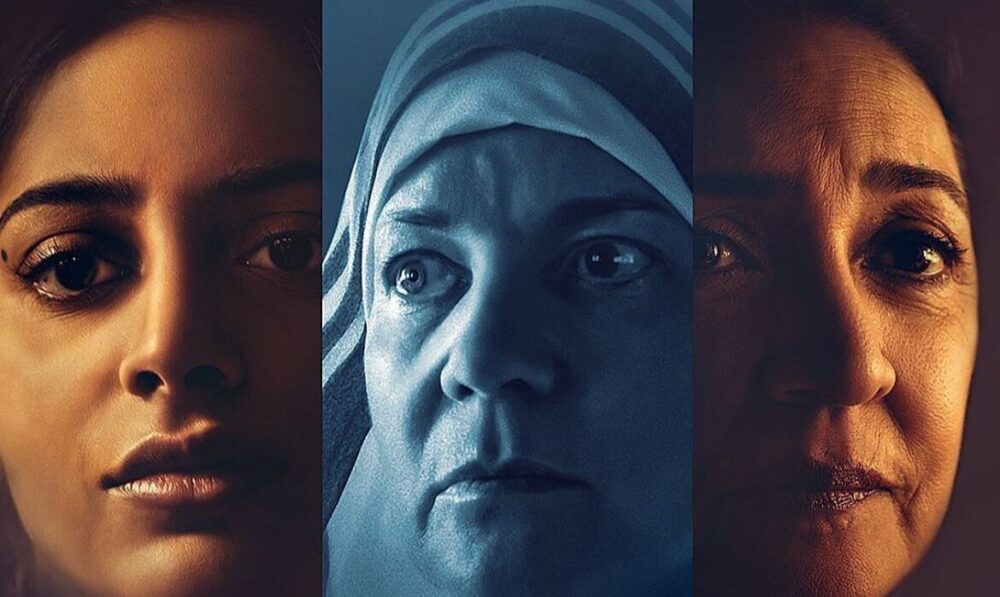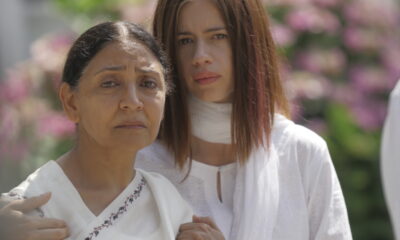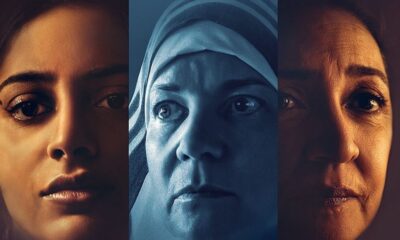Exclusives
‘Mother Teresa & Me is not a religious film… it’s about human values,’ says director Kamal Musale
Swiss-Indian director Kamal Musale and Swiss actress Jacqueline Fritschi-Cornaz talk about their film Mother Teresa & Me
Published
12 months agoon

“I was approached by Jacqueline Fritschi-Cornaz who plays the role of Mother Teresa in the film to think about making a film about Mother Teresa,” said Swiss-Indian director Kamal Musale who’s promoting his new international co-production Mother Teresa & Me, which is set to release in India on May 5.
Cine Blitz sat down with Kamal and actress-producer Jacqueline Fritschi-Cornaz to talk about their film. Jacqueline plays the titular role of Mother Teresa in the film also co-starring British actress of Punjabi descent Banita Sandhu and veteran Indian actor Deepti Naval. The director-actor duo talks about their film’s journey, controversies, and clear pre-conceived notions if any.
Kamal, what compelled you to make this film?
Kamal Musale: I was approached by Jacqueline Fritschi-Cornaz who plays the role of Mother Teresa in the film to think about making a film about Mother Teresa. I thought it was a good idea to make a film because of the emotions that I had kept in my mind for a long time when I was filming poor people, sick people, dying people, and general misery that you encounter in different parts of the world.
You don’t know what to do with those emotions. With this subject I thought we could really touch upon compassion and what one can feel and do. The idea of this film was to say that you can help the person next to you. You can have simple ways to make life easier for people. So, that was the start of the film.
While writing the film, I had a problem with Mother Teresa. As we know that she has lost her face. Not everybody knows, but because she has written a letter to confessors and this letter has been published after her death. So, we have learned that after having heard the voice of Jesus, “Go work in the slum for the poor,” as soon as she started working in the slum, she lost touch with Jesus and felt abandoned.
Also read: Kumar Sanu’s daughter Shannon K: ‘I want to follow in my dad’s footsteps of being a true artist!’
And this abandonment continued for years and all her life, but she said that to no one. She pretended that everything was fine. Only a few confessors knew about her ordeal. That way, the character was very interesting. But how do we understand the feeling of abandonment from a near Saint who misses Jesus?
Then came the idea to invent a character of today and it was Kavita played by Banita Sandhu. She is a modern British woman of today who has some problems of her own and comes to Calcutta in the hope of solving them. Through this, she happens to meet a nanny who happens to be the first little girl ever to be adopted by Mother Teresa back in the 1950s.
So, we go back in time and try to understand the beginning of Mother Teresa but we also follow how the modern young woman of today is facing different problems. And how a character like Mother Teresa influences her and helps her solve the problems of today. That’s why we made this film.

L-R Kamal Musale, Banita Sandhu, Jacqueline Fritschi-Cornaz, Deepti Naval
Jacqueline, is there an added responsibility or pressure while playing a historic figure like Mother Teresa?
Jacqueline Fritschi-Cornaz: Of course, it is a responsibility. But it is also a wonderful journey as an actor to dive into such a researched subject and capture different energies and emotions. I worked with the sisters at Shishu Bhavan in Calcutta. I was in Skopje to get to know more about Mother Teresa’s youth and met her family. I was in a monastery in Switzerland and learned an Albanian accent.
I worked on the physical structure and all the elements we call method acting. This was a fantastic journey with Kamal Musale as the director and a wonderful team. It was an incredible challenge and I feel honoured.
Also read: “Am overwhelmed at the glory”, reacts Rahul Rawail whose book on showman Raj Kapoor is being translated into ‘Russian’!
Was there a scope to add your own bits to the character or you had to stick to how Mother Teresa is supposed to be portrayed on screen?
Jacqueline Fritschi-Cornaz: It was important for us to be authentic and believable. But no one really knew about how she was and what she felt. There were only these letters that were published after her death that really showed us her state of emotions. I was so touched to see how deeply abandoned she felt and how deeply sad she was. Then, of course, you always add and enrich emotions with your own experiences.
Kamal, how different was your approach while directing Banita, Deepti Naval, and Jacqueline?
Kamal Musale: For me, it was not a question of the difference in generations of these three actresses. There was a difference in their personalities and to some extent experiences. They have their own ways to approach their work. What is important is that they have imagination which is the primary matter for acting. It often means that you can be playful.
I try to create a playground for actors where they can feel free, relaxed, trusted and that they can try. It’s not always easy because you have pressure from production and other external elements. You have to really work hard to solidify the space and with the help of the crew create a protective environment. It was a good experience.
Also read: Mithun Chakraborty’s ‘beret-cap-long-hair’ smart look inspired by iconic South American revolutionary?
With historic figures come cultural sensitivities. Did you anticipate any controversies while you were making this film?
Kamal Musale: Yes, it was anticipated. Because there have been controversies with Mother Teresa from the time, she became famous. Most often, controversies are groundless. Sometimes, they’re grounded. But that’s what people are. They’re not perfect.
There are conspiracy theories as well, like the idea of conversion. There’s no proof of it. It’s the fear of people about conversion that has taken the main stage. But we are not worried about the hate speech of people. Our focus is on the positive message of the film. It’s not a religious, ideological, or political film. It’s about human values. You’ll understand it when you watch the film.
Jacqueline Fritschi-Cornaz: I think it’s a wonderful film because it can inspire so many people, especially in today’s times of crisis and wars around the world.
What were the takeaways from the making of Mother Teresa & Me?
Kamal Musale: I am the writer, director, and editor of the film. For me, the biggest challenge was the production. Because I produced the film with three companies in three countries. So, as they say, the director is the captain of the ship and my job as the captain was to keep the ship on budget and on time through all difficulties.
The film looks like an expensive film but it is made on a thoughtful budget. We showed the film in previews and people liked it. So, artistically, it’s a success so far. That’s my takeaway.
Jaqueline Fritschi-Cornaz: My takeaway is the team. To be able to play a role like Mother Teresa, you need the support of a team. This team was just so wonderful. Being in an international co-production and being able to travel to different places was so enriching.
You may like


Banita Sandhu becomes Adivi Sesh’s leading lady in G2


The trailer for Goldfish featuring Kalki Koechlin and Deepti Naval is out now


Goldfish presented by Anurag Kashyap, featuring Kalki Koechlin, Deepti Naval and Rajit Kapur, in theatres on 25th August 2023


Mother Teresa & Me Review: Inspiring and gripping!


Deepti Naval, Kalki Koechlin’s GOLDFISH receives heartwarming response at IFFI 53


Deepti Naval, Kalki Koechlin starrer GOLDFISH receives a heartening response at 27th Busan International Film Festival






